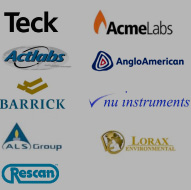One very rewarding and another unique aspect of MAGNET was our internships program. All MSc, PhD and postdoctoral trainees were required to hold at least one industrial internship, ideally spending ~20% of their time working with an industry partner. We carefully built long-term relationships and developed internships with our industry partners who included some of the top analytical, environmental and exploration companies in the world.
Overall, over 50 internships took place all over Canada as well as abroad, including Denmark (Greenland), the US and the UK. The format and duration of the internships varied widely, with some trainees moving to a different province for 2-4 months full-time, and others working 1-2 days per week throughout their degrees. Interns performed diverse tasks according to their backgrounds and level of experience, ranging from job shadowing to field work (mapping, sampling, monitoring) and more complex project-based work involving data compilation/interpretation, modelling, client interaction and reporting.
Our internships program was a clear success, as demonstrated by the fact that:
(1) most industry partners came back year after year to host MAGNET trainees;
(2) many industry partners offered jobs to former interns or other MAGNET trainees upon graduation; and
(3) all trainees went on to find solid employment in their fields due to the knowledge, skills and experience gained via their internships.
Trainees benefitted from their experiences:
“It was a major career/network-influencing experience and I feel very fortunate to have been given the opportunity to participate. The learning and networking opportunities were outstanding, and despite the necessary time commitment it was so much fun!”
“Personally, these industry internships provided me with a productive collaboration and vital work experience with a Vancouver-based environmental consulting company that yielded two chapters of my doctoral thesis, a journal publication, and a proposal currently under review for me to continue to work with them as a post-doctoral fellow.”
For legacy purposes, internship logistical information is available below.
Through practical work experience and interactions with industry representatives, MAGNET trainees will have a significant competitive advantage, being equipped with technical and professional skills that will improve job readiness, facilitate transition to the workforce and expand their possible career trajectories.
Rationale
NSERC: The program’s objectives are in line with one of NSERC’s Strategy for Partnerships and Innovation goals to connect people and skills, more specifically to place additional qualified candidates within Canadian companies. With the focus on developing skills that will be useful for the transition to the workplace, the CREATE Program is a great asset to industry, which requires not only technical skills, but professional skills.
It is expected that linkages between industry and academia will be enhanced, and that Canada’s People Advantage will be improved by increasing the supply of highly qualified personnel (HQP) who are “employer-ready” and can generate immediate results after graduation, improving job readiness as an immediate benefit to the industrial employer.
Industrial Collaborators
NSERC: In general, an industrial collaborator is defined as a Canadian-based business providing products or services, and that derives the majority of its revenues from the sale of these products and services and not from government aid. Such partners must be willing and able to exploit the research results for the economic benefit of Canada.
Multinationals may be eligible if they have commercial activities that take place in Canada, such as research and development or manufacturing related to the proposed research, and if the funded activity will result in significant economic benefit to Canada.
MAGNET industry partners represent some of the largest and most respected analytical, environmental, mining and mineral exploration companies in Canada and abroad. To improve the exposure of the trainees, host companies are not limited to these partners. MAGNET allows, and encourages, trainees to participate in multiple internships with different companies. Please contact the Program Coordinator if you would like more information about hosting a MAGNET intern.
Duration & Timing
NSERC: Trainees should spend a minimum of 20% of their time at the industrial collaborator premises (for example, 2-4 months at the MSc level and 8-10 months at the PhD level) over the duration of their involvement in the CREATE initiative. However, the completion of the degree should not be delayed (for MSc trainees: two years; for PhD trainees: four or five years). Note: All the CREATE trainees must hold at least one industrial internship.
The timing of the internship is flexible and may be carried out all at once, divided into multiple stages, or even spread throughout the year. This will depend on the requirements of the specific internship and the availability of the trainee.
Scope
As a geochemistry network with trainees specifically trained in this field of research, internships generally involve the application of geochemical principles or techniques to address challenges in industry settings.
Ideally the internship will be related, or at least relevant, to the trainee’s research topic. However, recognizing that this is not always feasible/practical, the internship may include other research or work, including day-to-day tasks, which will provide the trainee with technical and/or professional skills.
Finances & Logistics
During the internship, the trainee will be receiving his/her regular graduate student or postdoctoral stipend. This amount varies depending on the university and arrangement with their supervisor(s), and includes a significant contribution from MAGNET. Hosts are not required to top up trainee salaries, but may certainly choose to do so if they wish, to ensure that interns are appropriately compensated commensurate with their contributions to the company.
Hosts are expected to make “in-kind” contributions such as provision of basic requirements (e.g., desk space, computer), instruction/training, professional mentorship and access to company expertise/resources.
In cases where internships take place outside of the trainee’s home city/province, or internationally, MAGNET funding is available to help support the following: travel and accommodation expenses, travel insurance, and entry visa fees. The Program Coordinator and/or the host can assist with making local travel and accommodation arrangements.
If fieldwork is involved, the host is expected to cover the field expenses and equipment. MAGNET can contribute to safety-related expenses (e.g., protective gear, immunizations).
If the internship involves analyses at a MAGNET laboratory, an academic rate may apply if the analyses are within the scope of the trainee’s research topic. Analytical fees should be discussed and negotiated directly with the manager of the appropriate laboratory.
International students may require a work permit in order to participate in internships. MAGNET can provide guidance and assistance. Please contact the Program Coordinator.
Process
An updated industry-focused CV of each MAGNET trainee should be sent to the Program Coordinator within 2 months of beginning their graduate or postdoctoral studies. A plan to fulfill the internship requirement will be discussed and developed by the trainee, their supervisor(s) and the Program Coordinator within 4 months.
For trainees without a pre-arranged industry partner (arranged via their supervisor or personal contacts), the process will generally involve:
- Trainee expresses an interest in working with a particular company or in a particular industry. The Program Coordinator contacts potential hosts on behalf of the trainee. OR Industry partner expresses a need for an intern.
- Trainee’s CV is sent to the potential host.
- Potential host internally reviews the candidate(s), often involving a phone call or interview, and makes a decision.
- Host communicates directly with the intern (+/- their supervisor(s), Program Coordinator) to define the terms and conditions of the internship.
- Signing of confidentiality/non-disclosure agreement or contract (if required by the company).
Deliverables
Upon completion, MAGNET trainees will be expected to write a short summary (for inclusion in reports, newsletters etc.) and give a presentation to the other MAGNET trainees via video-conferencing. Hosts may have other deliverables or expectations, which should be clearly outlined to the trainee in advance.
The intellectual property policies of both NSERC and the university should be followed.






 Site by Sprout Creative
Site by Sprout Creative